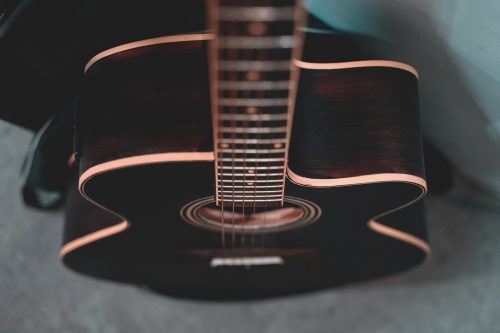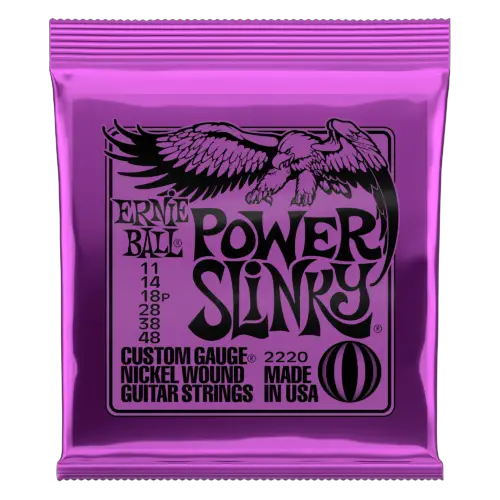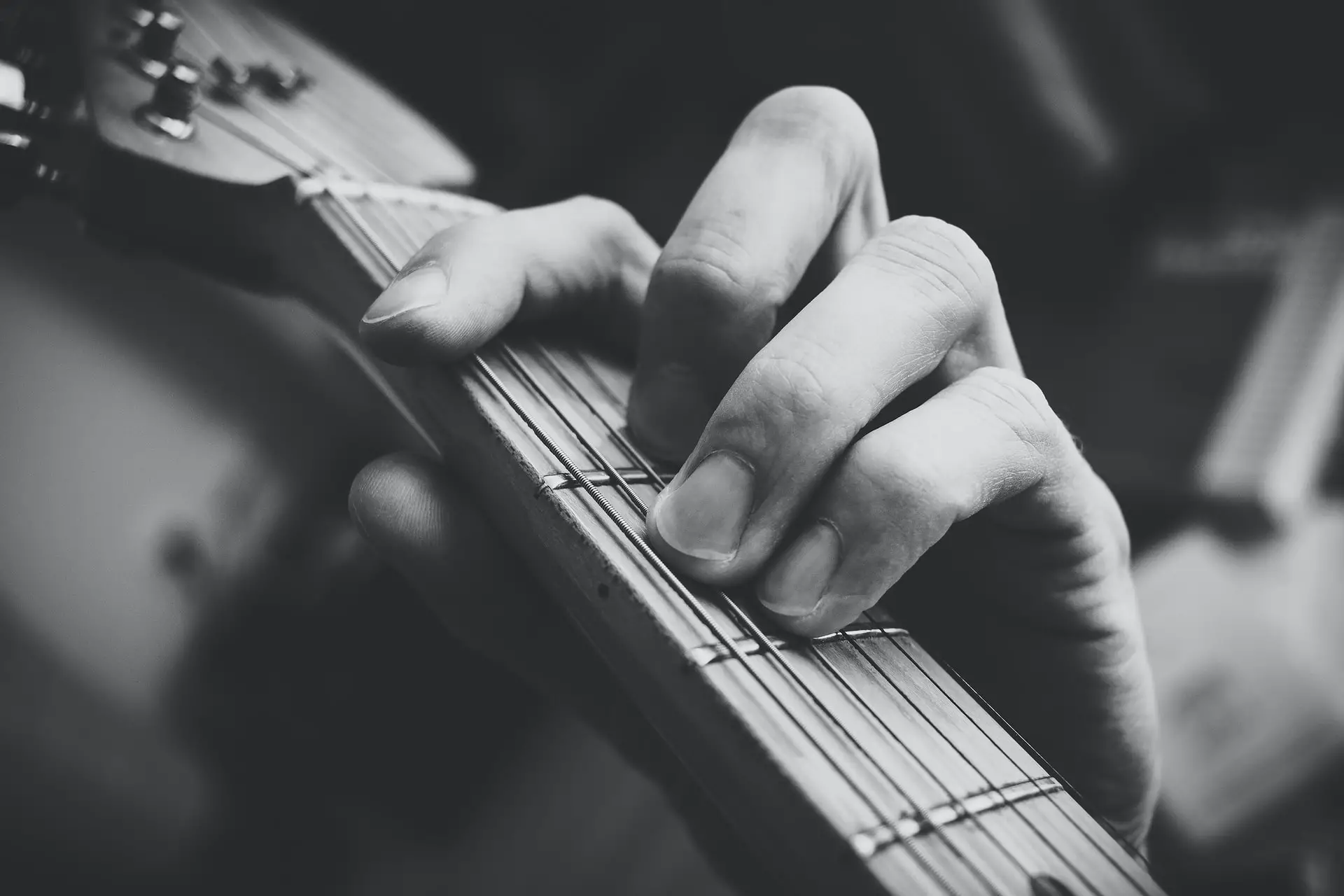Guitar strings can be made easier to press by using lighter gauge, thinner string and relieving the tension on the neck.
You can also make amends to your playing technique which includes using more fingers and positioning your wrist correctly.
A Lot of guitarists struggle with mastering the technique of pressing down the guitar strings comfortably and that causes sore fingers and wrist fatigue even after playing for a short period.
When I first started playing, the strings felt too hard to press down and I was left with sore fingers and blisters. However, instead of being discouraged, I learned various techniques which made pressing down strings much easier and made me a better guitarist.
In this article, I will share various techniques and the following topics to help make your guitar strings easier to press down and get rid of your sore fingers:
- How to press guitar strings?
- Ways to make guitar strings easier to press.
- Are some guitar strings easier to press down?
- Do experienced guitarists have problems while pressing down strings?
- Final verdict
How To Correctly Press Guitar Strings?
You should press the guitar strings only as hard as needed for the note to play properly. If you press it harder then you will hurt your fingers and if you press it any less then the note will not play properly.
Position your finger on the headstock side of the fret and not directly above it. Now apply enough pressure to make sure that the strings are touching the fretboard and producing a clear sound.
7 Ways To Make Guitar Strings Easier to Press
1. Use Lighter Strings
Lighter strings have low mass so they are easier to press against the fret. Lighter gauge strings require less pressure so they do not require much finger strength to be pressed down.
There are different strings available when it comes to gauges, which refers to the thickness of the string. Light strings usually have a thickness between 0.9s and 0.10s.
Light strings do not exert high tension on the guitar neck, so it is easier for you to press the strings as string tension is directly proportional to the pressure needed to press the strings.
So, if you feel like it is very hard to press your guitar strings, especially as a beginner, you should try using lighter gauge strings.
2. Use Good Quality Strings
Good quality strings which do not corrode or rust easily are easier to press onto the fret. Uncoated strings also make it easier to press your guitar strings as they have high elasticity.
Poor quality strings make pressing significantly harder as they have low elasticity and can easily rust and corrode.
To make your strings easier to press and to get rid of sore fingers after playing, you should invest in good quality strings for your guitar.

Higher quality strings are easier to press because they don’t rust as easily and have less thicker coating.
3. Detune Guitar Strings
Tuning your guitar strings at a lower pitch than the standard by loosening all the strings can make the guitar strings easier to press.
Detuning your guitar to a lower pitch releases some of the tension from the guitar which makes the strings easier to press.
If you find your guitar strings hard to press, especially as a beginner, then you should try detuning your guitar to a lower pitch than standard according to the sound you want to achieve.
Related article: Detuning Guitar 101: Why, How & When Should You Do It
4. Use Low action Strings
Having a low action or short distance between the top of the fret and the bottom of the string can make the strings easier to press. If this distance is too big, then you will feel uncomfortable playing your guitar.
Action height is the length between the bottom of the strings and the fret. Having a high action height requires greater energy and pressure from you to press the strings.
However, having a low action height can lead to an unwanted buzzing sound because whenever you pluck the string the vibration will touch the fret and create the buzz sound.
So it is important to adjust your action at a height that not only makes the strings easier to press but also prevents the buzzing sound.
Related article: High Vs Low Action String: Which Is Easier To Play & Strum
5. Utilize More Fingers
Guitar strings are easier to press and bend if you use more than one finger and include your wrist muscle to press the string.
A mistake that most beginners make is that they try to use one finger to press the strings. It is harder to apply pressure using one finger as compared to using 3-4 fingers.
So, if you feel uncomfortable playing your guitar and experience sore fingers then you should focus on using more fingers and also your wrist muscles to apply pressure on the strings.
6. Warm-up Before Playing
Stretching and warming up your fingers and hands before playing the guitar can make guitar strings easier to press.
One of the reasons that your guitar feels uncomfortable to play and the strings are hard to press is that you are playing with cold hands. Cold hands make it difficult for you to apply the required pressure.
To play comfortably, make sure that your fingers are properly warmed up and stretched or else you will feel discomfort while playing.
7. Practice Finger Strength
If your guitar is properly set up and you have adapted the correct playing method but your guitar strings are still hard to press down it means that your fingers are weak.
Just keep playing and you will eventually get used to it.
This is a common problem that a lot of guitarists have to face especially at the beginning so you do not have to worry because finger strength can be developed over time.
So if you have weak fingers it is perfectly normal for you to find it hard to press your guitar strings onto the fretboard because strings require a certain amount of pressure to be pressed.
Why Are My Guitar Strings So Hard to Press Down?
Your strings are hard to press down because your guitar is not properly set up, your playing technique is wrong or you lack experience. A high action, heavy strings or high tuning causes strings to be difficult to press.
If your guitar feels uncomfortable to play because the strings are hard to press down then you should make amendments to your guitar setup.
A high action, which is the distance between the top of the fret and the bottom of the string, causes the strings to be hard to press down. Similarly, setting your guitar at the standard high pitch makes the strings more difficult to press.
Heavy strings and poor quality strings are also harder to press down. Heavy strings hold more tension so you need to apply more pressure to press them down.
Guitar strings may be hard to press down because you are playing using the wrong technique, your hands are cold when you play or simply lack experience.
Why Do Guitar Strings Hurt My Finger?
The guitar strings hurt your fingers because your finger placement is not right or you are pressing on the strings too hard. The strings of your guitar might be hard to press down because of high action, heavy strings or high tuning.
If your fingers hurt after playing the guitar, especially as a beginner, you don’t need to worry. It is normal for your fingers to get sore and hurt when you start playing. It is bound to get better with practice but you can still take the mentioned steps to make the process easier.
Make sure that you are placing your fingers correctly and apply the right amount of pressure. You do not need to press too hard to have a note ring properly. This will only wear out your fingers quickly and cause them to hurt.
You can also use the above-mentioned ways of improving your guitar setup and technique to make your strings easy to press down so that your fingers do not hurt after playing.
Related article: Heavy Vs Light Guitar Strings: Sound, Playability & Tuning
Can You Press Too Hard on Guitar Strings?
As a beginner, it might be the case that you are pressing on the guitar strings way too hard. You only need to apply enough pressure to produce notes clearly and stop fret buzz.
If your fingers get sore and experience fatigue after playing, it may be that you are pressing too hard on the guitar strings. Many beginners believe that they have to press hard on the string to play the sound properly.
Even though it is not unusual for your fingers to hurt or develop sores, playing the guitar should not feel like you are pressing on the guitar strings with all your power. In that case, you are pressing on the strings too hard and need to take a step back.
Once your fingers toughen after practice and experience, playing should feel effortless like you are hardly pressing down on the strings.
How Do I Stop My Guitar Strings From Pressing So Hard?
To stop your guitar strings from pressing too hard you need to make sure that your instrument has the appropriate action height, light strings of good quality, and your guitar is not tuned at a high pitch.
It is important to reduce the distance between the top of the fret and the bottom of the strings, also known as the action because the greater the action height the harder it is going to be to press down the strings.
Lowering the tuning on the guitar by loosening the strings releases the pressure and makes the strings easier to be pressed down.
Investing in good quality strings and maintaining them regularly can also stop the strings from pressing down so hard.
Are Some Guitar Strings Easier to Press?
Lighter gauge strings are easier to press down as compared to heavier gauge strings because they have lesser tension and hence require less pressure to be pressed down. Other than that, nylon strings and electric guitar are the easiest to play because the strings are easier to press.
Lower gauge strings with lesser thickness are easier to play than heavy strings because they have less tension and require lower pressure to be pressed. Heavy gauge strings demand more hard work in order to be pressed as they have high tension.
The material of the strings and type of guitar should also be considered while choosing strings that are easier to play. Nylon strings and electric guitars are a good choice in terms of comfort and ease to play.

Light string gauge like 11 is much easier to press.
Do Advanced Guitarists Still Hurt Their Fingers When Playing?
It is common for even the fingers of advanced guitarists to hurt while pressing guitar strings but the amount of hurt and finger soreness reduces with practice and experience. Advanced guitarists know how to properly set up their guitar and know the correct playing techniques to minimize the hurt.
Advanced guitarists learn the right pressure that needs to be applied to play the required tone or sound so they do not exert unnecessary pressure which can hurt your fingers while playing.
Moreover, after a long time of playing consistently your fingers develop hardened skin caps on the tips called calluses which prevent their fingers from hurting while pressing the guitar strings.
Properly setting up your guitar can make the strings easier to press, so with time, advanced guitarists learn the correct action height, quality and thickness of strings and other components which leads to their fingers not hurting as much as they did as a beginner.
Final Thoughts – Pressing Guitar Strings With Ease
There are various ways of making things easier for yourself as a guitarist. To make your guitar strings easier to press down, lower the action and tune, choose light and good quality strings and improve your playing technique.
The pain of playing the guitar can be harsh in the beginning but practice makes one perfect. The trick is to practice consistently and not give up!
With the right guitar setup and correct playing method, you can make the strings easier to press down and reduce the pain and soreness which comes with playing this beautiful instrument.





